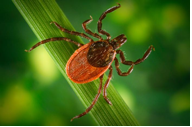Lyme Disease
Diagnosing and treating Lyme disease can be complicated. However, most patients who are diagnosed early and receive proper treatment usually recover rapidly and completely.
Lyme disease is a bacterial tick-borne illness that can cause skin, heart, joint and nervous system problems. In the early phases of Lyme disease, you may experience fatigue, chills, fever, headache, muscle and joint aches and swollen lymph nodes. A bulls-eye rash often, but not always, appears shortly after infection at the site of the tick bite. This rash, called erythema migrans, is sometimes observed in Lyme disease patients. If left untreated, the infection can spread to other parts of your body within several weeks. You may notice additional rashes, facial muscle paralysis (particularly on one side), meningitis causing severe headaches and neck stiffness, pain and swelling of large joints, shooting pains and an abnormal heartbeat.
Diagnosing Lyme Disease
 Unfortunately, it can be difficult to make a quick and accurate diagnosis. More often than not, it isn’t possible to confirm a tick bite. These creatures are tiny and prefer latching onto hard-to-see areas of your body such as the armpits, groin or scalp, so it’s likely you won’t notice its presence. By the time you start feeling sick, the tick could be long gone. In addition, ticks can carry multiple bacteria and parasites, including babesiosis, ehrlichiosis, anaplasmosis, Bartonella, and Rocky Mountain Spotted Fever (also called Spotted Fever Rickettsiosis). At least 20 percent of the ticks that carry Lyme also carry another infectious agent.
Unfortunately, it can be difficult to make a quick and accurate diagnosis. More often than not, it isn’t possible to confirm a tick bite. These creatures are tiny and prefer latching onto hard-to-see areas of your body such as the armpits, groin or scalp, so it’s likely you won’t notice its presence. By the time you start feeling sick, the tick could be long gone. In addition, ticks can carry multiple bacteria and parasites, including babesiosis, ehrlichiosis, anaplasmosis, Bartonella, and Rocky Mountain Spotted Fever (also called Spotted Fever Rickettsiosis). At least 20 percent of the ticks that carry Lyme also carry another infectious agent.
If you experience some symptoms of Lyme and have a high risk of exposure to ticks because you spend time outdoors in the warmer months or own outdoor pets, a helpful first step is the Horowtiz Lyme-MSIDS Questionnaire. Developed by Lyme expert, Dr. Richard Horowitz, this test should not replace medical advice from your physician but can be a useful tool to determine the likelihood of Lyme or other tick-borne illnesses. The only way to confirm or rule out a Lyme diagnosis is with a blood test.
Watch →
How We Can Help
For most cases of Lyme disease, a brief course of antibiotics is enough to clear the infection and become symptom-free; however, our approach is to take the time to explore the onset of your condition, the specific nature of your pain sensations and the overall status of your health. To gather additional information about your condition, your Kaplan provider may also order diagnostic laboratory testing (for example, for other tick-borne infections).
After reviewing all of the factors contributing to your condition, your physician will spend time talking with you about your diagnosis. Together you’ll create a customized and multi-dimensional treatment plan that addresses your symptoms and any possible co-existing conditions that may be causing or aggravating your health problems.
We offer a multitude of effective treatment options, including:
- Therapeutic Plasma Exchange
- Acupuncture
- Biotoxicity/Neurotoxicity Protocol
- Intravenous Supplementation
- Nutritional Counseling
- Physical Therapy
- Prescription Medication
- Sleep Evaluation & Management
We are here for you, and we want to help.
Our goal is to return you to optimal health as soon as possible. To schedule an appointment please call: 703-532-4892 x2
The Kaplan Method™
Years of experience in diagnosing and treating patients with complex, chronic conditions—such as Lyme disease—has allowed Dr. Kaplan and his team to create The Kaplan Method™ a structured, personalized diagnostic and treatment program designed to uncover and reverse the root causes of chronic illness by healing the immune system.
Additional Resources:
Fact Sheet: Post-Treatment Lyme Disease Syndrome Centers for Disease Control and Prevention (CDC)
Website: National Capital Lyme Disease Association





